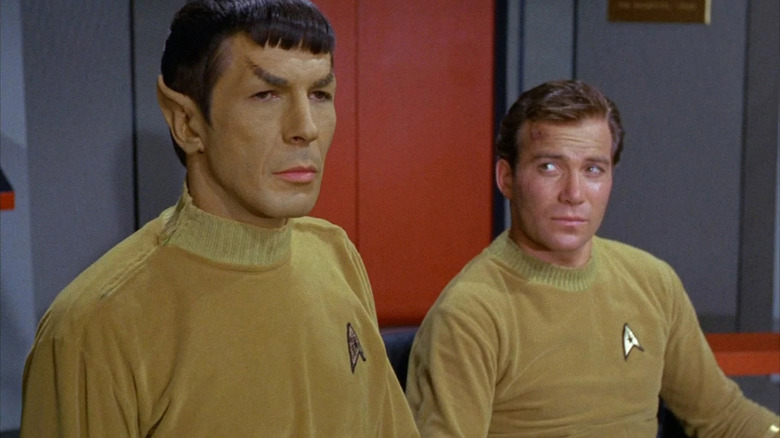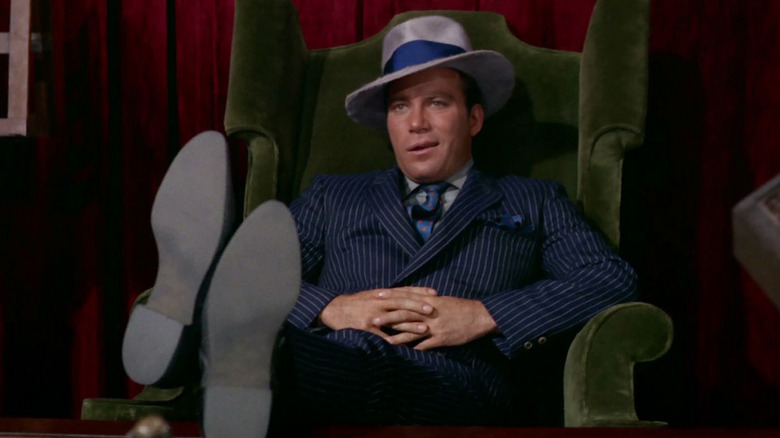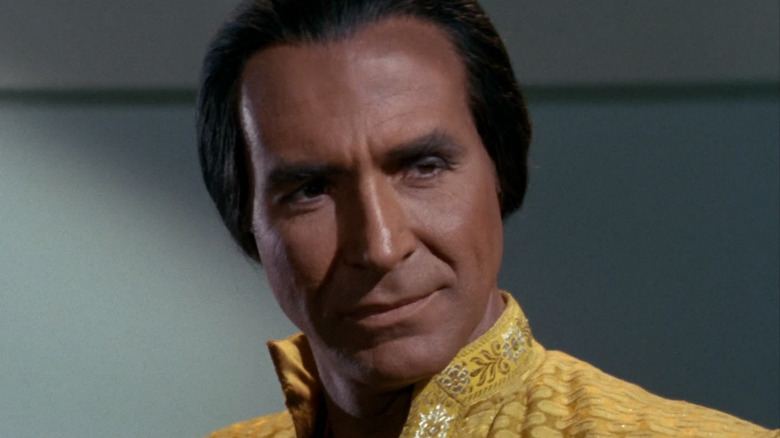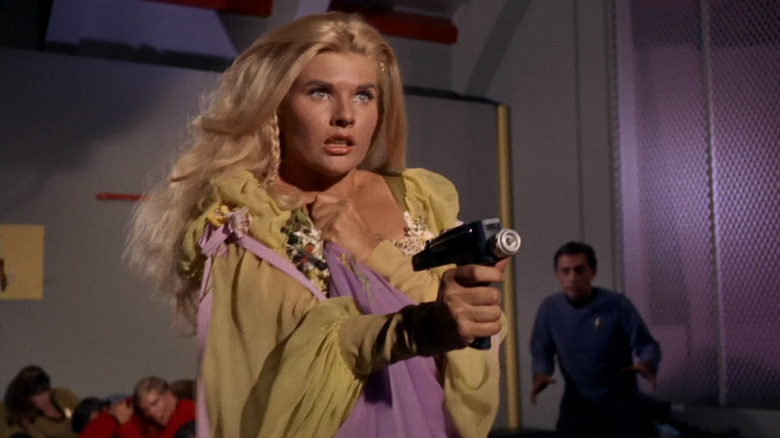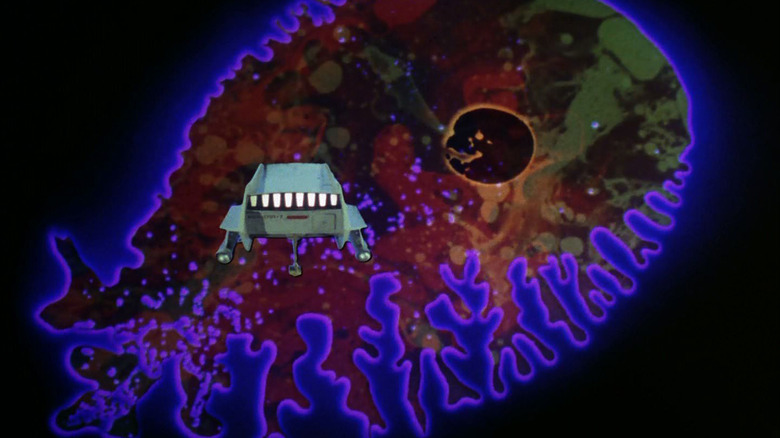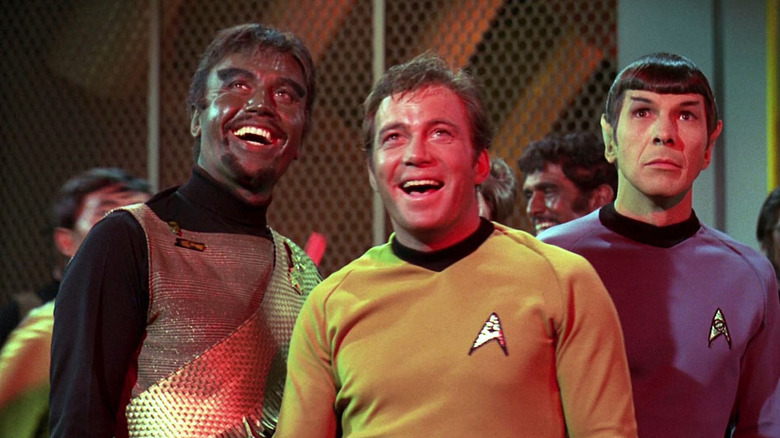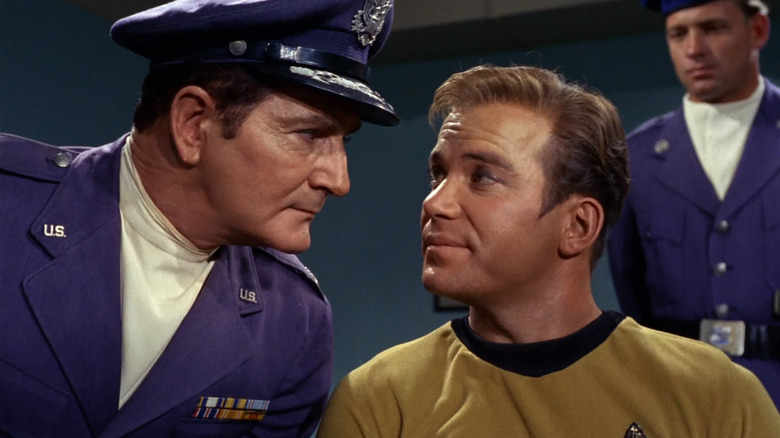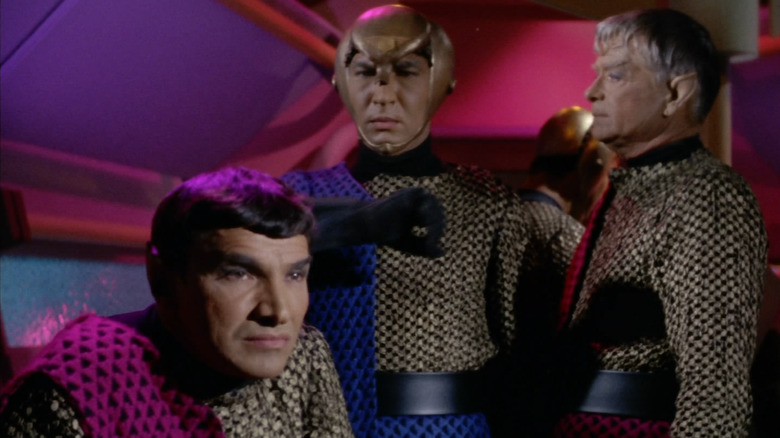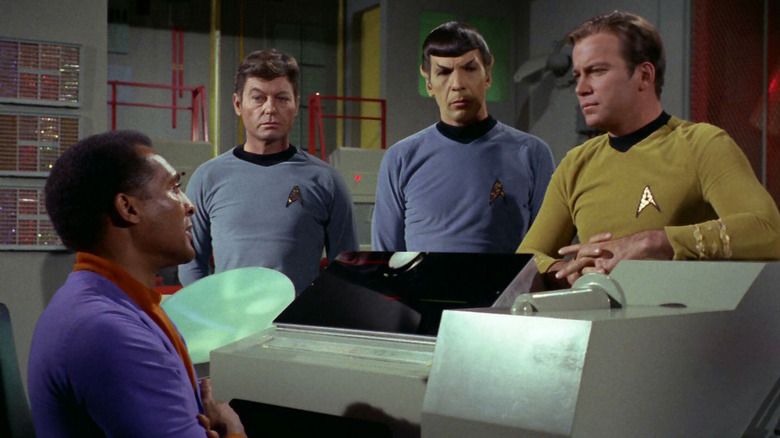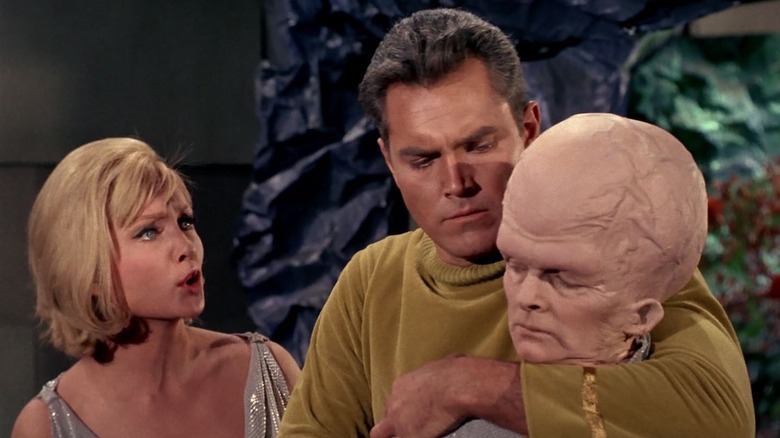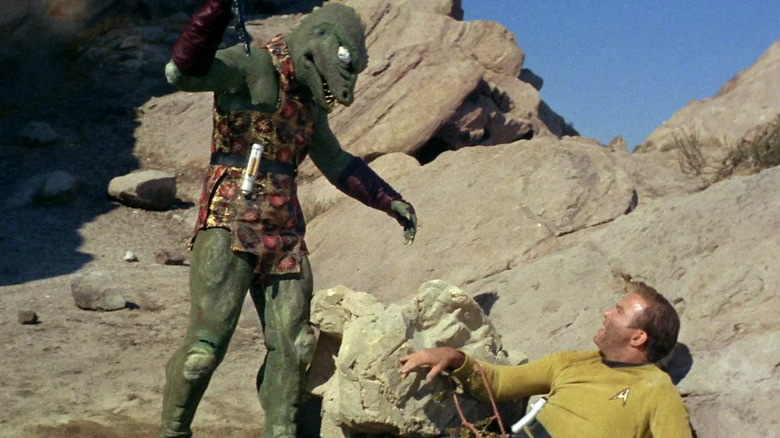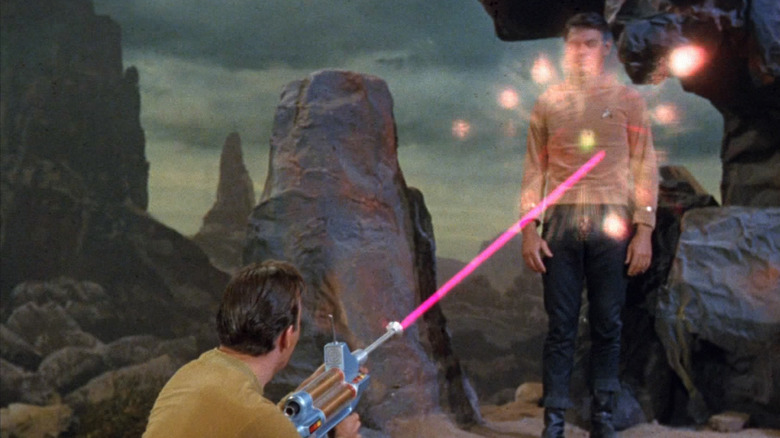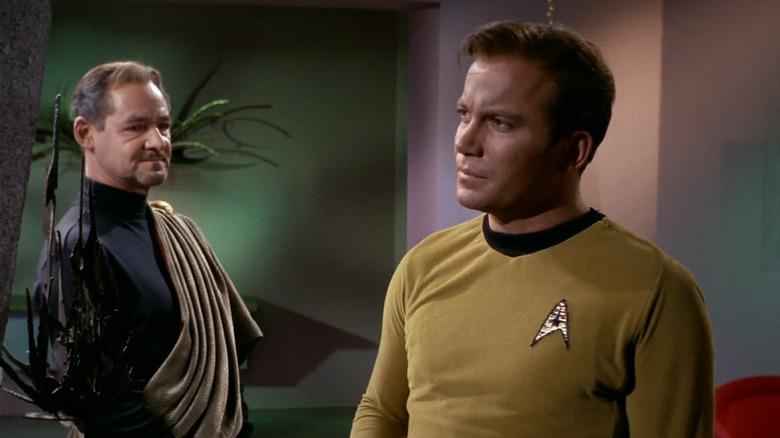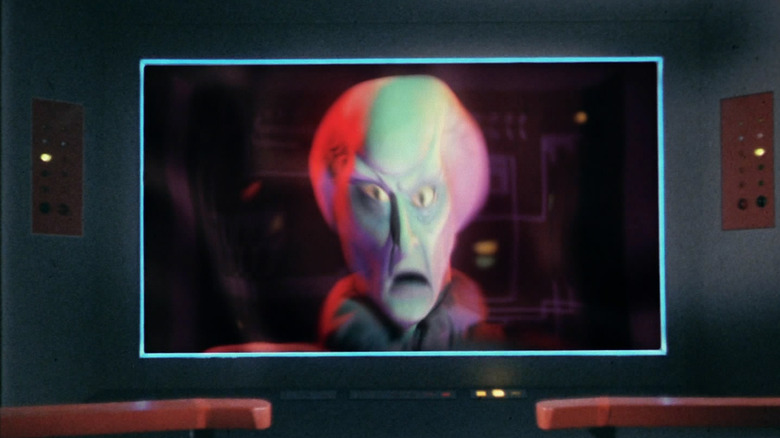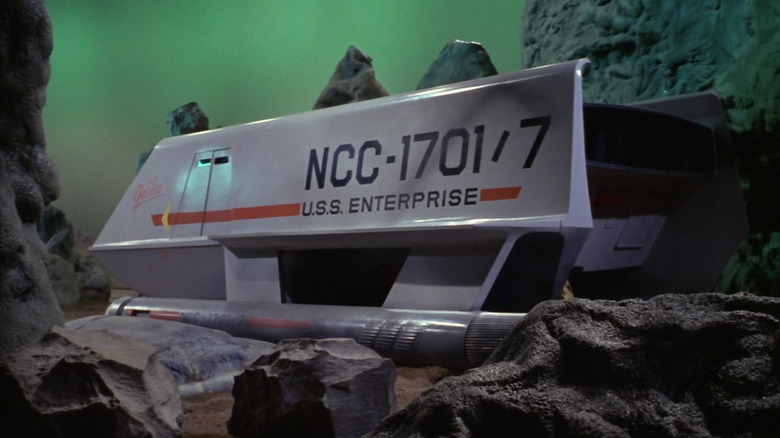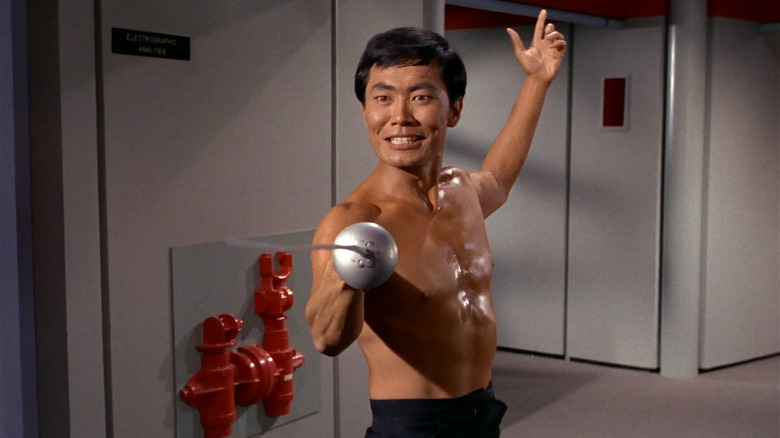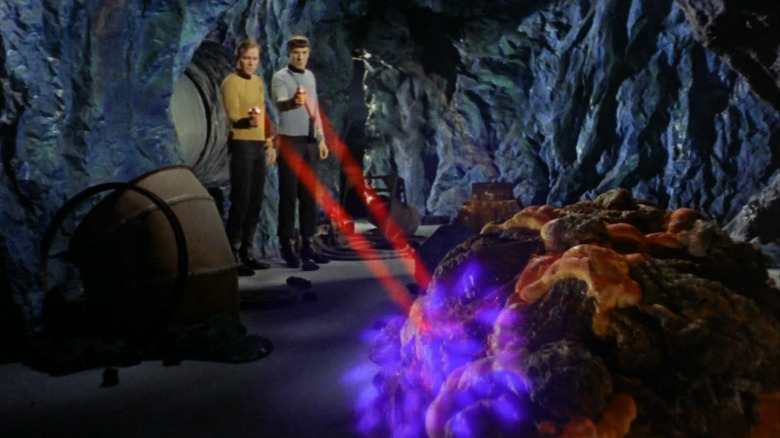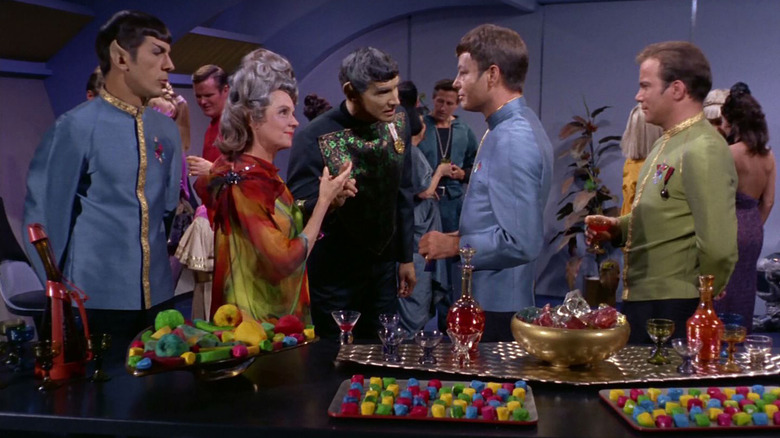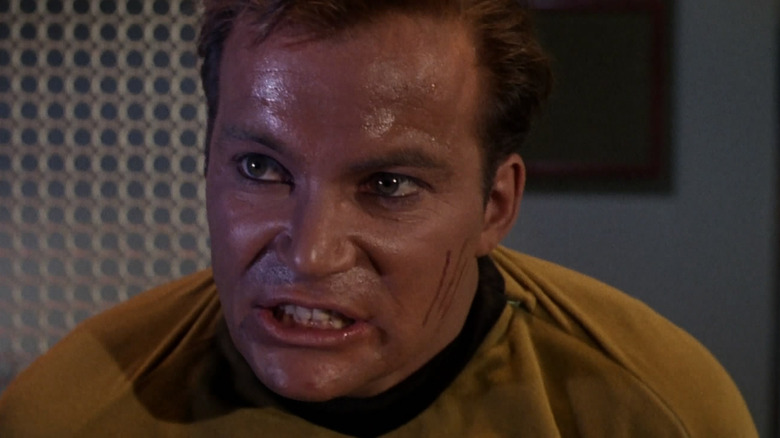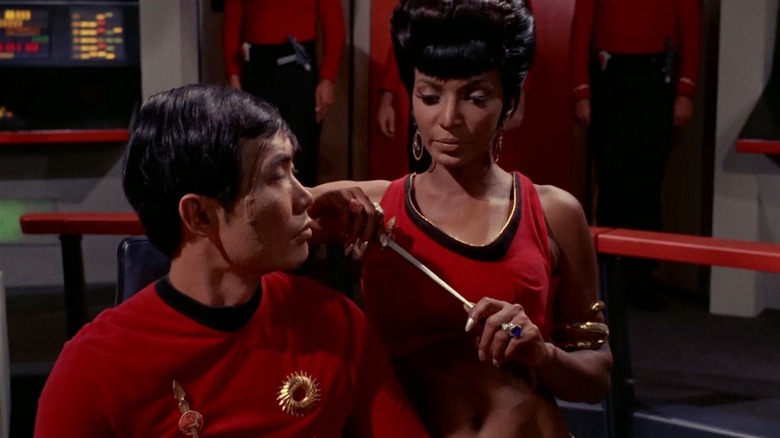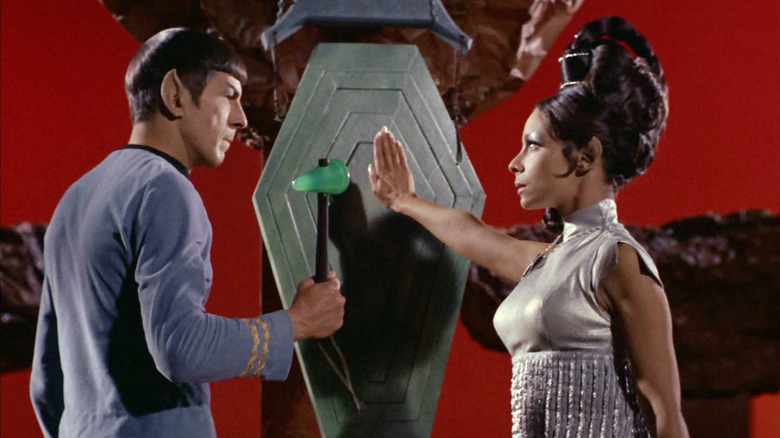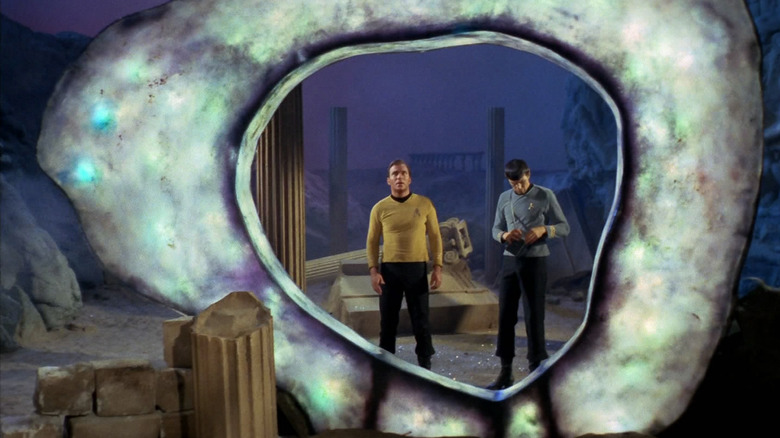The 21 Best Star Trek Original Series Episodes, Ranked
"You know. 1966? 79 episodes, about 30 good ones," said Philip J. Fry of "Futurama" to the jarred, floating head of Leonard Nimoy. This is his animated opinion, of course, but a better question isn't how many are good, but how many of the original "Star Trek" episodes are great. Would you believe 21?
Determining greatness is subjective of course. Popularity isn't a fair indicator of quality, and some fan favorites are guilty pleasures, while others are fun but defective in ways that knock them down from great to merely good. Any episode's overall quality depends on multiple factors — the uniqueness of the premise, the quality of the writing, the story beats, the characterization, guest stars, action, music, production values, and even visual effects.
Speaking of visual effects, we're not talking about the 15-year-old "remastered" CGI, which already look dated and cartoonish. We're going O.G. all the way. The criteria here is ranking these as the total package rather than the sum of their parts. With that in mind, here's a perhaps controversial list of the 21 greatest "Star Trek: The Original Series" episodes.
21. A Piece of the Action (Season 2, Episode 17)
Although humorous moments abound throughout the original "Star Trek," there aren't many outright comedy episodes. In fact, there are only three: "I Mudd," "A Piece of the Action," and "The Trouble with Tribbles." Most fans I know vote the straight "Tribbles" ticket, but that episode is merely cute-funny, whereas the over-the-top "A Piece of the Action" is actually genuinely funny. The script by Gene L. Coon is more absurd than "Tribbles" and features more comic business. The cherry on top was its helmer, James Komac, who was a gifted comedy writer and director of hundreds of episodes of shows including "Welcome Back, Kotter" and "Chico and the Man" (which he created).
This episode is almost a meta-commentary and spoof on the "Star Trek" schtick of "strange new worlds," which end up being monocultures thinly based on Earth's history. Here we see why the Prime Directive exists: An entire civilization has modeled itself on the popular mythos of Roaring '20s Chicago mobs. It's literally Planet Cosplay and an unintentional spoof of fandoms then and now. Two things keep it at this end of the list — it's shamelessly riffing on 1964's "Robin and the 7 Hoods," and it's almost irredeemably dumb. Fortunately, it's dumb fun, and fun enough to be among the best. "Right?" "Riiiiight."
20. Space Seed (Season 1, Episode 22)
You might be surprised that this comes in so low in a list of greats, but that it merits inclusion at all relies solely on the sheer screen presence and magnetism of its guest star. Khan Noonien Singh is an arrogant egotist and tyrant, but Ricardo Montalbán's confident performance makes him watchable. Minus him, the story defects would relegate this episode to merely "good." Many put this in their top 10, but I suspect that's because it basks in the reflected glow of its cinematic follow-up, "The Wrath of Khan."
The script is serviceable but unmemorable and commits the sin of making our heroes foolish instead of making Khan's intelligence and cunning the real danger. Kirk hands this unknown and suspicious character unfettered access to the ship's technical library on a silver platter, and historian Marla McGivers is a pushover who betrays all her shipmates because she's a fangirl of brutish dictators.
Weak story aside, the episode does have strengths. All the performances are good, and the story moves along at a brisk pace. There's memorable dialog, and McCoy really shines when he isn't cowed by Khan holding a scalpel to his neck. There's also some of the best miniature effects work on the show, going to the expense of a custom-made model of the Botany Bay. Montalbán is what makes it a best episode at all, but he alone can't elevate it.
19. The Conscience of the King (Season 1, Episode 13)
This least "Star Trek"-y of "Treks" scores points for being just that. The series premise allows it to be a semi-anthology, able to shift genres without breaking format, so one week it's a psychological drama about the duality of human nature, another time it's about cold war proxies or planet-killing doomsday machines or — as in this case — a Shakespearean tragedy about mercy and revenge. Just as Hamlet must determine whether or not his uncle Claudius murdered his father, so must Captain Kirk determine if actor Anton Karidian is the man once known as Kodos the Executioner.
Writer Barry Trivers cleverly frames his story within the play that informs it, a bit of dramaturgical license that permits a more theatrical approach. Take, for example, this bit of dialogue from Lenore Karidian: "There's a stain of cruelty on your shining armor, Captain. You could have spared him, and me. You talked of using tools. I was a tool, wasn't l? A tool to use against my father."
This episode exemplifies a shadowy aspect of Kirk's affairs rarely discussed in how he weaponizes romance to get what he wants. The ultimate irony is that he plays Karidian's daughter, Lenore, in order to get close to her father, only to learn that she's been playing him. That it's so different is a double-edged blade that simultaneously makes it a best episode, but nowhere near the top. It was a great stretch for the show.
18. The Immunity Syndrome (Season 2, Episode 18)
This one barely edges out the not-dissimilar and more popular "The Doomsday Machine." Both feature the crew of a sister ship annihilated by a huge alien thing endangering life throughout the galaxy. But where "Doomsday" is a straightforward adventure story driven by an Ahab-like guest star, "Immunity" is more personal, as it features some great and properly motivated Spock and McCoy conflict.
Too often, Bones would goad Spock for no reason, but here, their back and forth is professional. We've got two scientists vying for an opportunity to study this alien organism, each feels himself the most qualified to take on what promises to be a no-return mission, and each, perhaps, is choosing to make the sacrifice rather than let the other die. But it's Kirk who has to make the final, heartbreaking choice of which of his friends to send. That's classic "Trek."
Given its budget and the visual effects tech of the time, "Star Trek" was rarely able to get across truly alien life forms, but this is a notable exception, and the conceit that the Enterprise must enter the alien entity as a virus infects a cell is a nice twist. The visual effects of the space amoeba thing are fabulous and weird, something the 2007 remastered CGI does not improve on.
17. Day of the Dove (Season 3, Episode 7)
The third season of "Star Trek" has no classic episodes, but a few come close. "Day of the Dove" is the best of the bunch. The simple premise of exploiting bigotry between our heroes and their Cold War counterparts, the Klingons, works better than it ought. If you want to look for a message, the alien entity that fuels the very hatred and violence it feeds upon can be read as a stand-in for the military-industrial complex, which fans the flames of conflict in order to sell weapons in a perpetual feedback loop. Alternatively, you can just take it for a MacGuffin.
The nefarious influence of the alien entity memorably amplifies the slightest biases of the Enterprise crew, and it's uncomfortable to hear blatant racism coming of out our noble heroes' mouths, especially Scotty's attack on Spock. Michael Ansara plays Kang as no mere mustache-twirling bad guy but as a shrewd enemy starship commander, an honorable warrior, and a fine opposite to Kirk. By turns personable, calculating, and violent, he's a model Original Series Klingon. Frankly, I'd rather watch him than Khan; your mileage may vary. It's got action. It's got character conflict for days. It's the best the third season has to offer, but it's not as great as the first- and second-season entries coming up.
16. Tomorrow Is Yesterday (Season 1, Episode 19)
The original "Star Trek" didn't play with time travel much, and when it did, the results were either very good or they were horrid, with the backdoor pilot "Assignment: Earth" being the low point. On the flip side, you've got "Tomorrow Is Yesterday," which features the most offbeat teaser of the series, following an Air Force F-104 interceptor, with the visual punchline that the bogie it's after is the USS Enterprise.
What follows is illogical as all get out, but the gimmick of the Enterprise being tracked as a UFO and having to undo the temporal damage it's done by being photographed and accidentally crushing that Air Force interceptor is great and the story milks it for all it's worth. No real depth here, but the fun is all in the plot events and reactions of the crew.
There's some great in-character stuff in the episode, including Spock's statement that he too doesn't believe in "little green men" and his one-star ranking of the Air Force film of the Enterprise as "bad photography." Kirk's playfully resigned responses to his Air Force interrogator are great too. And, hey, Sulu even gets to get off the bridge. The main weakness is the "how does that work?" ending gimmick of beaming people back into their own bodies. Great, but not a classic.
15. Balance of Terror (Season 1, Episode 14)
A fan favorite for good reason, "Balance of Terror" depicts the loneliness of command as Kirk tries to seek and destroy a marauding alien vessel without triggering an outright war. Seeing some of the "lower decks" types makes the Enterprise feel more real and lived-in and sells that Kirk's every decision has repercussions beyond the bridge. But it's Mark Lenard's perfectly pitched turn as the unnamed Romulan commander that's most memorable here. Torn over the ramifications of the performance of his duty, he's Kirk's equal in every way, and you can believe that he loses this battle not by dint of any personal failings but merely because his ship is outmatched by the much quicker and faster-firing Enterprise.
For 1966, the effects are great and largely still hold up. The Romulan ship is simple and distinctive, and the music is spot on. The main thing keeping it out of the top 10 is that it so baldly swipes elements of the films "Run Silent Run Deep" and "The Enemy Below," slapping pointed ears on the German Kriegsmarine story from the latter film, borrowing its war-weary commander and a subordinate fanatically loyal to their political leader. In "Arena," the show paid for the rights of the story it was cribbed from and credited the author. No such screen credit graces this obvious lift.
14. The Ultimate Computer (Season 2, Episode 24)
Kirk is infamous for offing overzealous computers (see: Landru in "Return of the Archons," Nomad in "The Changeling," and the androids of "I Mudd"), but his personal best computer kill is in "The Ultimate Computer." Here, he doesn't merely melt down the M5 Multitronic unit by confronting its flawed logic regarding its purpose; he aims a precise surgical strike at the chink he spots in its programming armor — appealing to the morality inherent in the memory engrams its all too human creator imprinted it with, causing it to reason it must die to pay for the sin of murder.
This episode is character-driven, with Kirk confronting his own redundancy and possible irrelevancy even as Spock and McCoy make their loyalty and friendship clear. Guest star William Marshall's turn as the deranged Dr. Daystrom is a standout, ranking among the best of the show.
All this drama is supported by some fine action, as M5 reduces a redshirt to a puff of smoke, photon torpedoes a robot ship, and then nearly destroys four sister ships of the Enterprise, actually killing the entire crew of one. Even the light ending — which often play as callous given the events which precede them in many episodes — is acceptable here because it's about Spock and McCoy, not Kirk. But it's still Kirk vs. the Computer, and those are never "Star Trek" at the very top of its game.
13. The Cage (Original Pilot)
Forget "The Menagerie" with its paper-thin envelope around the first pilot, repetitive courtroom scenes, and forced cliffhangers, all of which render it a solid but not great installment. On its own, "The Cage" is not just a great launchpad for what "Star Trek" is and would become but an imaginative and well-executed story in its own right. Gene Roddenberry's script is smart, with the atrophied Talosian aliens a satirical stand-in for TV audiences who might rather live other people's fantasies than experience adventures of their own. While it's a bit talky and static in places, when they're in action, it's great stuff — notably the laser cannon scene and Pike's illusory fight on Rigel VII.
Visually it's terrific. This was the most expensive episode of the series ever made, and it shows. The sets, costumes, makeups, and many special effects are top-notch for a show of the era particularly the matte shot of the Rigel VII fortress. The pacing's a bit loose, the characters don't pop due to the largely meh casting, and "THE WOMEN!" Number One and Yeoman Colt secretly wanting to bone the Captain is cringeworthy. However, guest star Susan Oliver's performance is the standout here, followed by Leonard Nimoy as Spock. Ultimately, it's just as well that the far more energetic William Shatner stepped in to replace Jeffrey Hunter's less-than-charismatic version of Captain Pike.
12. Arena (Season 1, Episode 18)
If any episode of "Star Trek" is truly iconic, this is it. The action set piece on Cestus III is the biggest of any in the series, with running and jumping and explosions galore, a redshirt vaporization, a detonating tricorder, and a photon torpedo-sque mortar. Once back on the Enterprise, Kirk's dogged determination to overtake and destroy the enemy ship demonstrates the obsessive nature of his character, but communication with his alien foe plants a seed of doubt which ultimately empowers him to practice what he preached in "A Taste of Armageddon: " We're human beings with the blood of a million savage years on our hands, but we can stop it. We can admit that we're killers, but we're not going to kill today. That's all it takes. Knowing that we won't kill today."
Kirk doesn't kill, and it saves the day. It lands here amongst the best because the story ends with the overused first-season gimmick of the godlike entity — the others being Gary Mitchell, Charlie-X Evans and his Thasian truant officers, Trelane the god-child, and the Organians — but the Metrons are more a plot device than anything. The Gorn is a great and worthy adversary, even as its slow-motion gestures are laughable. Spock hanging a lantern on Kirk's cannon-building is a bit much, but hey, he's the costar and has to do something.
11. Where No Man Has Gone Before (Season 1, Episode 3)
It might be a surprise seeing "Where No Man Has Gone Before" on this list, but despite the second pilot weirdness of different uniforms, series crew regulars appearing not at all (McCoy, Uhura) or in different jobs (Sulu is an astrophysicist), and Spock's not-quite-there characterization and more severe makeup, the core "Star Trek"-ness is there in spades. Kirk makes a risky decision in the first act and must deal with the building consequences for the balance of the show, finally shouldering personal responsibility for his decision in the worst way possible: In order to save his ship and crew, he's forced to kill a subordinate shipmate and friend.
The episode looks great (being far more expensive than any regular production episode), repurposes the planet set built for the even more expensive first pilot, and features more optical effects than would be the norm for a production episode. Most importantly, William Shatner's Kirk projects leading-man charisma of the sort that's arguably what sold the show. It also delivers on Gene Roddenberry's original high-concept pitch of a "'Wagon Train' to the stars," where stories would focus on strong guest stars interacting with the recurring cast. The script is not without its flaws, and had Gary Mitchell been a tad more likable, the drama would have played even better. Still, two thumbs way up.
10. A Taste of Armageddon (Season 1, Episode 23)
"New civilization" planet stories rarely yielded great episodes, often setting up straw man civilizations for Kirk to knock down, but this one bucks the trend with a story smart enough to rank among the best. Kirk vs. the Computer legendarily has Kirk talk the machine to death, but now and again, he goes for the direct approach. Here, the computers coldly run simulations and select innocents to die, and Kirk has zero compunction about blasting them, finally forcing two civilizations to finally attempt to negotiate peace after 500 years of a "war" where death has been made so neat and tidy they see it as a necessary evil rather than something to stop.
Goodies include Scotty's head-butting with Ambassador Fox, Kirk's arguments about war with Anan 7, and Kirk threatening to have the Enterprise rain destruction down on a planet that's not faced a real attack in centuries. The moral? Any war held at arm's length is mere statistics, something the American people had grown accustomed to until television thrust the reality of Vietnam into their living rooms each evening. That's a lesson we must learn over and over again in conflicts where we increasingly use long-range and smart weapons to strike people we never even see. It's a message as relevant today as when it was first aired.
9. The Corbomite Maneuver (Season 1, Episode 10)
Effectively the "third pilot" of "Star Trek," this was the first regular production episode to go before the cameras, and it had the luxury of a rehearsal day, a solid director, and a fine script. It even ends with a quintessential "Trek" twist: Our implacable foe ends up being an erstwhile friend. By rights, this should've been the first episode to air as it sets up the whole show, but it was nowhere near ready at the premiere, in part due to the sheer number of optical effects in post-production. Dr. McCoy is wonderful from his first appearance, and his camaraderie and professional conflict with Kirk set the stage for their entire relationship.
The weird flagship Fesarius is pure alien goodness, and the Balok puppet is iconic. Memorable business includes Sulu's countdown, Spock's logic and resulting lack of imagination, Scotty's comment about Spock's parents, and McCoy and Kirk's conflict over Bailey. A highlight is the briefing room scene, with its lived-in atmosphere with piles of tapes and empty cups of coffee showing instead of telling us how hard the crew has been working on their predicament. Likewise, the Enterprise feels like a real lived-in ship, with corridors bustling with the crew, something the show would lose as fixed costs increased and studio budgets didn't grow to match. It's one of the 10 best, held back only because it drags in some spots.
8. The Galileo Seven (Season 1, Episode 16)
Albeit loosely inspired by the 1939 survivor drama "Five Came Back," this episode charts its own course as Spock tries and fails to resolve a potentially lethal situation with logic alone. It's rare that adventure shows of the time would depict a lead character failing, but that's just what "The Galileo Seven" does.
As in "The Corbomite Maneuver," we are again shown that Spock's logic can serve as blinders that prevent him from seeing all the possibilities, even as he tells Scott, "There are always alternatives." As such, when they become stuck on a mysterious planet, he expects the giant natives to react rationally to a show of force and brings them right down on the party. He's likewise ill-equipped to deal with the emotional frailties of the crew under his command, especially the insolent and insubordinate Lt. Boma, memorably played by Don Marshall, later of "Land of the Giants."
The B-story with Kirk desperately trying to locate the lost shuttle against a ticking clock demonstrates the sorts of no-win scenarios a ship captain must face. The production scores visually for the full-size shuttlecraft, as well as the visual effects depicting it and its sister crafts' departure and return to the Enterprise hangar deck.
7. The Naked Time (Season 1, Episode 4)
The fourth episode aired, "The Naked Time" is the foundational character-building segment of the series, peeling away the surface of Kirk and Spock and revealing a bit of what makes them tick. It's also entertaining as hell, with a slow burn as the crew is at first blissfully ignorant of the inhibition-inhibiting compound brought aboard and then having to deal with the resulting chaos. Sulu's descent into madness is charming, and George Takei was always at his most charismatic when he got to play unhinged. Sadly, neither Uhura nor Rand's secret selves get explored, and poor Chapel is reduced to pining for Spock as her primary character trait for most of the series.
The only weak spot here is that the "science" part of science fiction went out of the airlock. A collapsing planet is as preposterous an idea as the notion that the Enterprise is forced to constantly alter its orbit to study it. But guest crewman Kevin Riley is fun, and Scotty gets two great lines here, the first being, "I can't change the laws of physics," and the second an example of technobabble that's simple and audience-friendly: "You can't mix matter and antimatter cold!"
6. The Devil in the Dark (Season 1, Episode 25)
"The Devil in the Dark" is unique for being the only one to open with no sign of the Enterprise or her crew. Effectively a redo of series opener "The Man Trap," this episode succeeds where its predecessor fails not merely because the crew act more rationally but because a narrative twist turns the titular "Devil" into a sympathetic character. The Kirk-Spock dynamic is on fine display here as Spock first wishes to capture the creature alive and Kirk wants it dead, but Spock's feelings for his captain override his desire for scientific knowledge the instant he believes Kirk is in danger.
Spock urges his captain to "kill it!" even as Kirk susses out that the creature may be more than a monster. This is the first instance of Spock mind-melding with a wholly alien life form, a gimmick that would be taken to preposterous extremes in "Star Trek: The Motion Picture." Leonard Nimoy's "pain!" emoting is a bit over the top even for the time and keeps the episode out of the top five. Otherwise, he and William Shatner display the chemistry that made the show work even when the scripts let them down. This script does not let them down.
5. Journey to Babel (Season 2, Episode 10)
This world-building episode fires on all cylinders and never misses a beat. If writers then or now needed a model for how to write "Star Trek," this is it, and it's hands down the best episode penned by Dorothy "D.C." Fontana. There's a story conflict as the Enterprise ferries quarrelsome ambassadors and their aides to the titular "Babel" conference over a matter of Federation business. There's an interpersonal conflict between not just Spock and his parents but also between Spock and Kirk and Bones over relinquishing command.
There's physical conflict as ambassadors brawl, one is murdered, and Kirk is ambushed and wounded. We meet lots of aliens, see a bit of galactic politics, and get a nail-biter of a finish as McCoy tries to perform delicate surgery while Kirk struggles to keep it together amidst attacks by a seemingly unstoppable, unknown ship.
Mark Lenard returns not as a Romulan but as Spock's Vulcan father, Ambassador Sarek, who picks up on Leonard Nimoy's Vulcan portrayal and crafts one uniquely his own. Memorable too is Reggie Nalder, whose burn-scarred face and Austrian accent accentuate his alienness in the role of the blue-skinned Andorian delegate Thelev and established Andorians as Federation members, who would not be explored on TV for decades. Spock's family drama is a bit conventional for an alien culture, and just a dash more of the Vulcan alienness we got in Ted Sturgeon's "Amok Time" would have made this perfect.
4. The Enemy Within (Season 1, episode 5)
With a script that takes a pinch of "Strange Case of Dr. Jekyll and Mr. Hyde" and adds a dash of "All About Eve," "The Enemy Within" really delivers on the "Star Trek" promise to be an "adult" show by exploring the uncomfortable idea that even the noblest have a dark side and that our shadow selves are necessary parts of being human. The scenes with Kirk, Spock, and McCoy crackle with intellectual and emotional tension, and Spock finding Kirk's condition so "fascinating" neatly propels the drama while hinting at his own duality. William Shatner's twin performances as the understated compassionate Kirk and the scenery-chewing "imposter" demonstrate his range.
A few missteps are the weird editing — where events happen out of order, such as when Spock states they have an intruder aboard long after they've established the transporter duplicated the dog-thing — Rand being expected to stand up for herself in front of her alleged attacker, Kirk, and the silliness of Spock reporting that the malfunctioning transporter duplicated the thermal heaters beamed down and not thinking to beam down blankets or other insulation to help keep the stranded Sulu and company from becoming human popsicles. Additionally, Spock's closing crack at Rand about the imposter's qualities was and remains cringeworthy.
3. Mirror Mirror (Season 2, Episode 4)
This is the poster child for episodes that manage to become classics despite the premise being as dumb as a box of rocks. Absolutely nothing about the scenario makes a lick of sense. There's a parallel universe where all the same people end up on the same ship despite having vastly different histories and a culture of assassination. The starships in both universes happen to be on the same planet and beaming the same four people at the exact same time, and our parallel-universe leaping characters and their barbaric counterparts somehow switch wardrobes — and presumably underwear — mid-transporter beam.
What saves it is the sheer entertainment value of this gaudier imperial Starfleet and the skewed versions of familiar regulars inhabiting it. Evil Sulu's a sweaty seducer, mirror Chekov is a back-stabbing opportunist, and bearded Spock was a meme before we knew we had memes. The best Uhura performance can be found here, and Nichelle Nichols should be remembered for this over that overrated and involuntary interracial kiss. The only thing that could have made it better was had Yeoman Rand been brought back as "the Captain's Woman." The big speech to mirror Spock about the illogic of waste is Kirk at his Kirkiest, and that's the perfect capper on a perfectly entertaining classic that ranks right near the top.
2. Amok Time (Season 2, Episode 1)
The Vulcan episode to rule them all is one of those rare world-building episodes of the original series, except here the strange new world is Spock's home planet. Vulcan civilization is memorably introduced in a most unexpected way — by demonstrating that the coolly logical Spock is anything but when it's time to swim upstream and spawn. However, Spock's mate-to-be, T'Pring, employs the logic our Vulcan hero adores in order to escape her obligations to him and make her own choices.
Everything about the scenes on Vulcan works splendidly, from matriarch T'Pau's officiating and T'Pring's challenge to the big Kirk-Spock battle. Okay, and the wonderful and memorable OTT music is the icing on the cake. The first half on the Enterprise has some nice comic moments, as well as some solid Kirk-Spock-McCoy interaction, but as with many episodes where a mystery is involved, the tension of the first half doesn't play quite as well on repeat viewings.
Fortunately, the drama and conflict on Vulcan are top-notch and hold up. The punchline in sickbay is a classic because the bigger the dramatic tension, the bigger the comic release, and given all the action on the planet, the funny tag feels totally earned for a change.
1. The City on the Edge of Forever (Season 1, Episode 28)
No surprise here, as it tops a great many lists, but "The City on the Edge of Forever" excels not only because the core drama is compelling but because of the care with which it was put together. The most expensive regular production episode of the series, all the money is up there on the screen, from the period costumes to the backlot shooting, new sets, stock footage, and the flashing Guardian time donut. William Shatner, Leonard Nimoy, and DeForest Kelley are all in fine form here. Guest star Joan Collins isn't great, but she's fine.
Story-wise, the fish-out-of-water situation, the incredibly high stakes, and the crushing inevitable tragedy make this the exemplary segment. Even gutted by ham-fisted staff rewrites by the "Trek" staff (in my opinion), Harlan Ellison's core story premise remains moving in spite of the on-the-nose sermon by Edith, the racist joke at Spock's expense, and the complete absence of the tragic Trooper character on whom the irony of who amongst us "matters" hinged. Kirk's episode-closing "let's get the hell out of here" was not any kind of TV first, but it was the perfect minimalist button that the story needed. What more was there to say?
